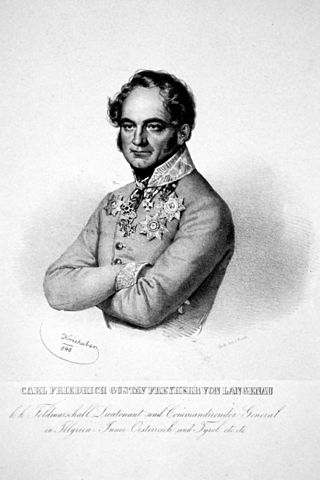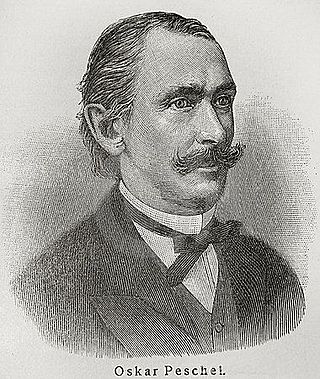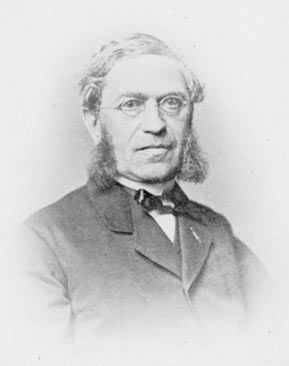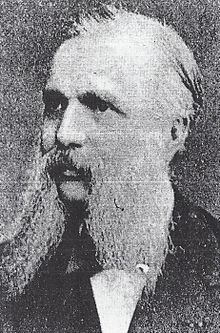
Albert was King of Saxony from 29 October 1873 until his death in 1902.

Saxony, officially the Free State of Saxony, is a landlocked state of Germany, bordering the states of Brandenburg, Saxony-Anhalt, Thuringia, Bavaria, as well as the countries of Poland and the Czech Republic. Its capital is Dresden, and its largest city is Leipzig. Saxony is the tenth largest of Germany's sixteen states, with an area of 18,413 square kilometres (7,109 sq mi), and the sixth most populous, with more than 4 million inhabitants.

Count Friedrich Ferdinand von Beust was a German and Austrian statesman. As an opponent of Otto von Bismarck, he attempted to conclude a common policy of the German middle states between Austria and Prussia.

Gustav Anton Zeuner was a German physicist, engineer and epistemologist, considered the founder of technical thermodynamics and of the Dresden School of Thermodynamics.

The May Uprising took place in Dresden, Kingdom of Saxony in 1849; it was one of the last of the series of events known as the Revolutions of 1848.

Fritz Reuter was a novelist from Northern Germany who was a prominent contributor to Low German literature.

Friedrich Karl Biedermann was a German professor, politician, and publisher who greatly aided the Liberal movement in Germany during the process of German Unification.

The Royal Saxon State Railways were the state-owned railways operating in the Kingdom of Saxony from 1869 to 1918. From 1918 until their merger into the Deutsche Reichsbahn the title 'Royal' was dropped and they were just called the Saxon State Railways.

Friedrich Karl Gustav Freiherr von Langenau, Imperial Field Marshal-Lieutenant, was Quartermaster-General of the Army of Bohemia, in 1814, and Austrian Army of the Upper Rhine, under Schwarzenberg in 1815.
Gustav Woldemar Freiherr von Biedermann was a jurist, literary historian, and Goethe researcher.

Hermann August Theodor Köchly was a German philologist and educational reformer.

Oscar Ferdinand Peschel was a German geographer and anthropologist.
Gustav Adolph Ackermann was a German lawyer and author of a notable book on European knightly orders.

Edward Schröder was a Germanist and mediaevalist who was a professor at the University of Göttingen and published editions of numerous texts.

Franz Jacob Wigard was a German physician who eventually built a career as a liberal politician in the Kingdom of Saxony.

Wilhelm Schaffrath was a German jurist and politician. He was a member of the Frankfurt Parliament in 1848, and after 1871 a member of the national Reichstag. He was also, at various stages, a member of the Landtag of Saxony.

Bernhard Hirschel was a German physician, writer and liberal activist who lived and worked in Dresden. He became a pioneer of Homeopathy.

Saxony in the German Revolution (1918–1919) followed a path that went from early control by workers' and soldiers' councils to the adoption of a republican constitution in a series of events that roughly mirrored those at the national level in Berlin. Because some members of the revolutionary councils, which were set up in major cities such as Dresden, Leipzig and Chemnitz, wanted a soviet-style council government while others favored a parliamentary republic, there was considerable internal disagreement that caused a split between the two groups. In early February 1919, elections were held for a state assembly, the Volkskammer, in which the moderates gained control. An outbreak of violence at the time of the March 1919 Kapp Putsch led the national government to forcibly remove the Leipzig workers' council, the last one remaining in the state. Saxony went on to become a constituent state within the Weimar Republic in November 1920.

Eduard Gustav Ludwig Adolph Wach, known as Adolf Wach was a German jurist, a professor in Königsberg, Rostock, Tübingen, Bonn and Leipzig.
Friedrich Gustav Schilling was a German musicologist, editor and lexicographer.

















